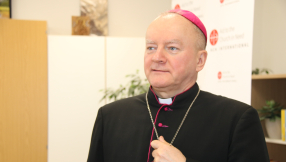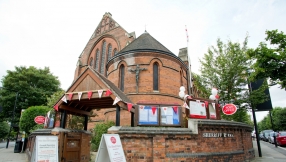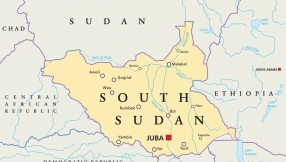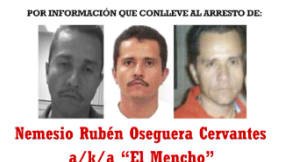'O little town of Bethlehem how troubled we see thee lie'
The carol is an unchanging favourite among Christians, yet those who have seen what the town of Christ's birth is like today would prefer not to sing it this Christmas.
Bishop Michael Doe of USPG: Anglicans in World Mission was in the Holy Land just last month on a pilgrimage which left him in no doubt that the Bethlehem of today is no longer the still idyll that inspired Phillips Brooks to write the carol after his own pilgrimage to the Holy Land in 1868.
|PIC2|"A couple of the pilgrims said that they would not go to carol services this year and sing 'O little town of Bethlehem how still we see thee lie' because they've actually seen what Bethlehem is really like and have said that this year they will not engage with all that sentimental stuff," says Bishop Michael.
The imposing Israeli security wall, supposedly built to prevent Islamic suicide bombers, now runs along the outskirts of Bethlehem. It is a "ghetto", Bishop Michael puts it frankly, and one faced with "real problems for employment particularly among young people".
The security wall only seems to have made matters worse in this regard. "If the only job they [young people] can get is outside of Bethlehem, then they could find themselves spending two or three hours in the morning and two or three hours in the afternoon just getting through the wall," he continues.
"It's like Berlin was in the old days. The people are under siege."
So long as Christian pilgrims are happy to stay in Jerusalem, they can usually enjoy the privilege of being "swept through the gate" of the security wall with only moderate hassle. If, however, pilgrims are bold enough to insist on staying within Bethlehem itself, an experience far closer to that encountered daily by ordinary Palestinians may ensue.
Says Bishop Michael, "We had deliberately chosen to have a Palestinian coach, and we had deliberately decided to stay in Bethlehem - the tourist board like you to stay in Jerusalem in an Israeli hotel which they subsidise, and have you just take a day trip to Bethlehem.
|PIC1|"But we decided that we would go and stay there for two nights and for that reason I think we were treated very badly at the wall. They made us get out of the coach and walk though the security gates, which ended up being very good for our group because it actually gave them a taste of what Palestinians have to do every morning and every evening.
"It is a practically annoying, but also humiliating experience where people are being denied access to their own country."
Rev Tim Woods, who accompanied Bishop Michael on the pilgrimage, was left troubled by his time in Bethlehem.
"We were very worried about the people we met in Bethlehem and there was a sense of sadness and oppression about the place," he recollects. "The Christmas carol does not do justice to the present day. It's not 'how still we see thee lie'. It's actually 'how troubled we see thee'."
He continues, "I think all of us have real concerns about what the Israeli state is doing, and a real concern that actually it is operating against a lot of the tenets of the Jewish faith."
The picture of Bethlehem today is clearly very different to the peaceful and serene scenes of Jesus' birthplace that will adorn millions of Christmas cards around the world this year.
Much of the town's troubles are rooted in the ongoing conflict between Israel and Palestinian Islamic militants. The November peace talks in Annapolis in the US have offered a glimmer of hope that a peaceful settlement may be reached, but the ill-sentiment on both sides is sure to make peace difficult to achieve, if not impossible.
"What was clear was that the tendency of both the Orthodox Jews and the more hardline Muslims was to look to resolve the conflict by further conflict. They are going head to head," says Rev Woods.
In the midst of all the conflict and division, however, the tiny Christian community in the Holy Land, known affectionately as Living Stones, is choosing to swim against the tide by working towards a peaceful solution built on the Christian tenets of forgiveness and reconciliation.
"The Christian churches are saying loudly and clearly, we have to work for peace, we have to find ways of forgiving each other and work towards reconciliation to overcome conflict," adds Rev Woods.
"That's our gospel imperative."













